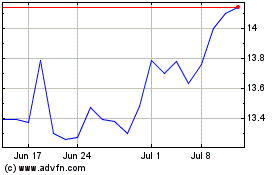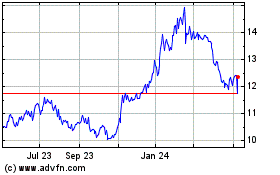Hit Game Spurs Trespassing Suit -- WSJ
April 05 2017 - 3:02AM
Dow Jones News
By Sara Randazzo
Annoyed homeowners say "Pokémon Go" players have gone too far in
their quest to master the smartphone game -- and they want the
company behind the hit application to be held responsible.
A federal judge is poised to decide if a lawsuit alleging the
game's developer violated trespass and negligence laws can go
forward, a ruling that could have broader implications for makers
of games or other software that send users to specific
locations.
"Pokémon Go," based on the Japanese franchise popularized by
Nintendo Co. in the 1990s, sends millions of players each day
searching for Pokémon characters on a digital map. Players gain
points by catching the monsters, which appear superimposed into the
real world through location-tracking technology and augmented
reality.
The court decision is expected in the coming weeks in a case
brought by residents in New Jersey, Florida and Michigan. They say
the popular game caused hordes of people to physically trespass on
their land. They also say the game violates their rights by placing
virtual game pieces on or near their private property without their
permission.
The lawsuit raises novel legal questions over whether a company
can be held liable for the allegedly inappropriate conduct of
others, or be found responsible for virtual trespassing. Both
issues are likely to gain relevance as more augmented-reality games
hit the market. Such games use the Global Positioning System,
camera and other elements of a player's smartphone to tether play
to their physical surroundings.
"The law here is very messy," said Shawn Bayern, a law professor
at Florida State University. "Each state handles it slightly
differently."
In a series of lawsuits filed after the launch of "Pokémon Go"
in July, plaintiffs claim smartphone-toting players caused
disturbances as they hunted for virtual game characters placed at
specific GPS coordinates.
Residents of the Villas of Positano on the South Florida coast
said hundreds of people began infiltrating the 62-unit complex,
parking illegally and even relieving themselves in the landscaping
during late-night visits to "catch" virtual characters. Another
plaintiff, a New Jersey lawyer, said at least five people knocked
on his door asking for access to his backyard.
In Michigan, a couple said a quiet nearby park became overrun
once it was tagged as a location in the game, creating a nightmare
for neighbors as players stormed the area, blocked driveways and
peered in windows. The separate lawsuits were consolidated in U.S.
District Court in San Francisco and seek class-action status.
The intrusions, the plaintiffs say, amount to negligence and
trespassing by the game's developer, Niantic Inc. They claim not
only that Niantic is responsible for players who physically
trespassed, but also that the placement of the virtual characters
is itself a form of trespassing.
Legal experts say trespass and negligence laws vary in each
state and that little, if any, case law exists over how to handle
virtual intrusions.
Key to both laws is the intent of those allegedly trespassing or
causing a nuisance and whether actual harm occurred. Finding a way
to adapt the laws to situations like those raised in the lawsuit is
"something that needs to be addressed over the long run because the
technology is not going away," said Gregory Keating, a professor at
the University of Southern California Gould School of Law.
Niantic, which spun out of Alphabet Inc.'s Google in 2015, is
asking a judge to dismiss the case and says the plaintiffs are
distorting the law. The company argues that trespass laws only
cover physical intrusions, not virtual ones. Such a virtual
intrusion "is less invasive than noise, vibrations, dust, or a
chemical cloud, all insufficient for trespass," Niantic says in a
court filing.
Niantic argues that if software developers are prevented from
tying on-screen virtual objects to locations or sending users to
specific places, many online services would be threatened. Those
could include websites or mobile applications listing real estate
open houses or locations where rare birds have been spotted, or
navigation systems pointing out shortcuts, "all of which can
attract visitors and impact nearby residents," Niantic said.
They further argue that the game requires users to agree not to
trespass as a condition of playing, and that if a player
overstepped his or her bounds, it shouldn't fall on them. "Niantic
does not control millions of players' real-world movements," the
company said.
That argument may not hold up in court, said John Nockleby, a
professor at Loyola Law School in Los Angeles. The company can't
hide behind a boilerplate user agreement, he said, if they know a
million users will be tempted to trespass if they place a virtual
Pokémon on private property.
The initial fever around "Pokémon Go" has subsided, though
several million U.S. users still play it daily and it generates
more than $30 million in monthly gross revenue world-wide,
according to market-research firm Sensor Tower Inc.
--Sarah E. Needleman contributed to this article.
Write to Sara Randazzo at sara.randazzo@wsj.com
(END) Dow Jones Newswires
April 05, 2017 02:47 ET (06:47 GMT)
Copyright (c) 2017 Dow Jones & Company, Inc.
Nintendo (PK) (USOTC:NTDOY)
Historical Stock Chart
From Mar 2024 to Apr 2024

Nintendo (PK) (USOTC:NTDOY)
Historical Stock Chart
From Apr 2023 to Apr 2024
